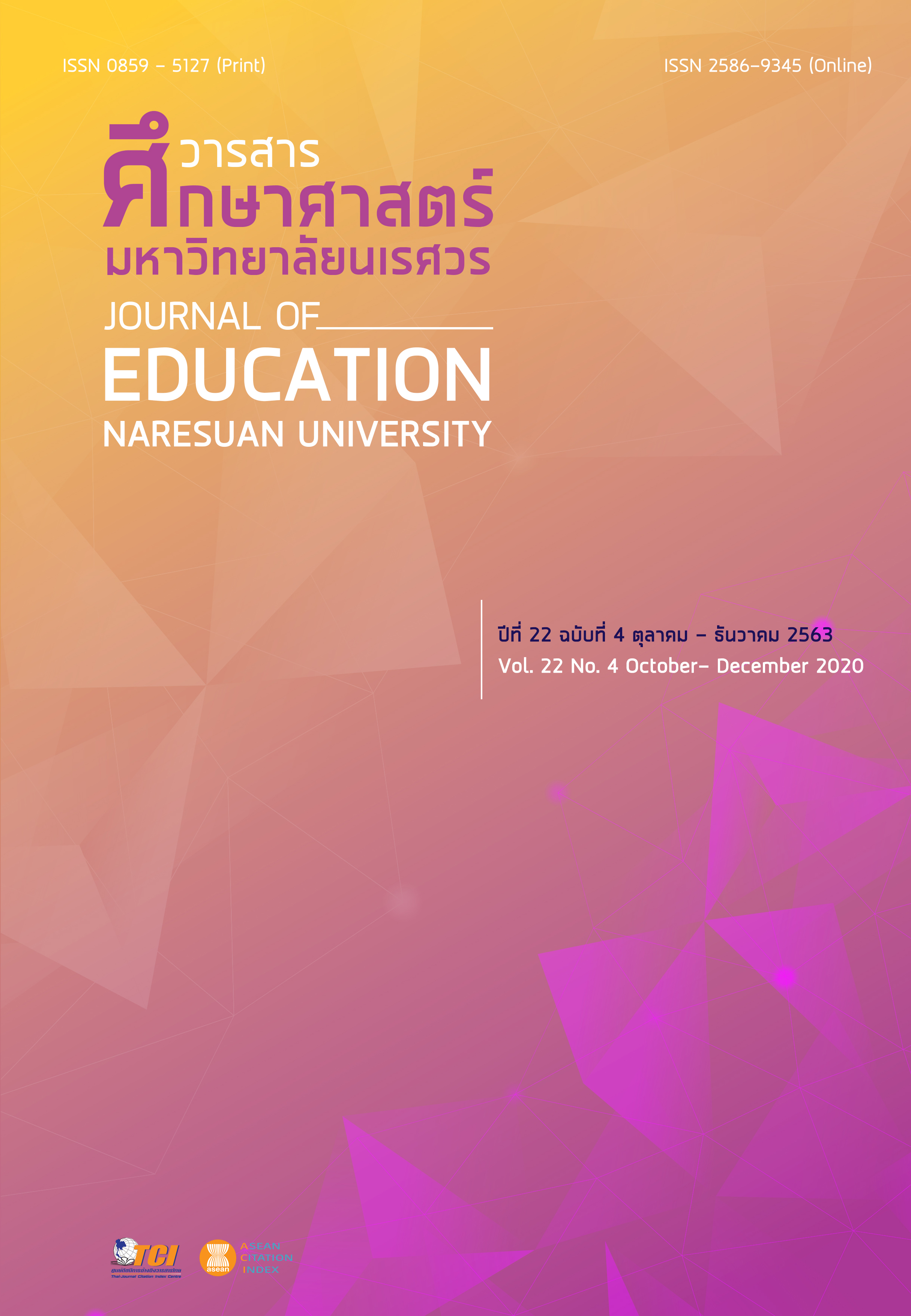DEVELOPING PROBLEM- BASED LEARNING APPROACH WITH ROLE PLAYING FOR ENCOURAGE ENVIRONMENTAL LITERACY IN PHOTOSYSTHESIS MATTHAYOMSUKSA 5 STUDENTS การพัฒนาการจัดการเรียนรู้ตามแนวคิดปัญหาเป็นฐานร่วมกับบทบาทสมมติ เพื่อส่งเสริมการรู้สิ่งแวดล้อมของนักเรียนชั้นมัธยมศึกษาปีที่ 5 เรื่อง การสังเคราะห์ด้วยแสง
Main Article Content
Abstract
This action research aimed to develop the problem-based learning approach with role playing model for encourage environmental literacy in photosynthesis contents. The participants were 45 students in Phitsanulok Province. The research tools consisted of 3 lesson plans, reflective journals, environmental activity sheets and environmental literacy tests. The process of action research had been proceed 3 cycles, and this research used content analysis with method triangulation and resource triangulation for reliability of data. The results showed that there were 6 steps the problem-based learning approach with role playing model. Step 1: define story, instructor determine the actual situation and being close to the students with using illustrations to explain the situation. step 2: group discussion and identify topic, instructor asks questions related to the situation in order to instruct students to share, analyze and discuss problems. Step 3: literature research, each student group search the ways to solve environmental problems from a variety of sources. step 4: information sharing, instructor and students share the information obtained from the search and together summarize the knowledge in order to avoid misunderstandings with media to help summarize the content. Step 5: assessment of outcomes, students choose the best solution for solving environmental problem together. Step 6: presentation and evaluation, students present ways to solving environmental problems by acting in a role play and plan the best way to solving environmental problems together with other groups. In addition, the results showed that after learning management with the problem-based learning approach with role playing, the environmental literacy of students were developed. Most students can assess in identify environmental issues, investigate environmental issues, evaluate and make personal judgments about environmental issues, and use evidence and knowledge to select and defend one’s own position to resolve issues competency that they lack before learning management.
Article Details
The owner of the article does not copy or violate any of its copyright. If any copyright infringement occurs or prosecution, in any case, the Editorial Board is not involved in all the rights to the owner of the article to be performed.
References
Detyothin, O., Singsriwo, A., & Suksringarm, P. (2017). The development of environmental literacy of Mattayomsuksa 3 students using the project-based teaching with problem-solving thinking. Journal of Education Naresuan University, 19(2), 305-317. [in Thai]
Erdogan, M. (2009). Fifth grade students’ environmental literacy and the factors affecting students’ environmentally responsible behaviors (Doctoral dissertation). Ankara: Middle East Technical University.
Hasan, K. (2012). Exploration of environmental literacy in science education curriculum in primary schools in Iran. Procedia Social and Behavioral Sciences, 46, 404–409.
Heepkaew, P. (2009). Development of problem solving abilities and science learning achievement on resources and the environment of Matthayomsuksa 3 students by organizing problem-based learning activities (Master thesis). Khon Kaen: Khon Kaen University. [in Thai]
Jaitieng, A. (2007). Principles of teaching (4th ed.). Bangkok: Odeon store. [in Thai]
Johar, M. (2016). The level of environmental literacy toward vocational high school students in West Java Province. Innovation of Vocational Technology Education, 2, 66-70.
Khammani, T. (2007). Variety of teaching and learning options. Bangkok: Chulalongkorn university. [in Thai]
Longsiri, T. (2018). The level of environmental skills of students who graduated at the lower secondary level at a school in Rayong province. Silpakorn University Journal, 11(1), 2814-2826. [in Thai]
Panghom, R., Srisanyong, S., & Teeravanitrakul, S. (2016). Construction of learning packages using a problem-based approach relating geographical phenomena for Matthayomsuksa 4 students. Journal of Education Naresuan University, 18(4), 278-293. [in Thai]
Phanyosri, P. (2015). Effects of learning according to the concepts of scientific and social issues that affect according to the environmental literacy of junior high school students (Master thesis). Bangkok: Chulalongkorn University. [in Thai]
Sitthichok, T. (2016). Learning management of environmental literacy in institute. Inthaninthaksin Journal, 11, 177-197. [in Thai]
Sitti, S. (2016). Development problem-based learning by using PISA problem situation to promote the ability to link learning and attitude towards teaching and learning of Matthayomsuksa 4 students. Journal of Education Mahasarakham University, 10, 598-611. [in Thai]
Srbinovski, M., Erdogan, M., & Ismaili, M. (2010). Environmental literacy in the science education curriculum in Macedonia and Turkey. Procedia Social and Behavioral Sciences, 2, 4528-4532.
Srikramkru, R. (2008). Teaching techniques. Bangkok: Ramkhamhaeng University. [in Thai]
Tosuksri, W. (2010). Using questions in teaching. Retrieved 30 May 2018, from http://www.ns.mahidol.ac.th/english/th/departments/MN/th/km_clinical.html
Wongaiam, S., Chaiprasert, P., & Srisangyong, S. (2016). The development of learning and ability in problems solving thinking in life and environment for grade 10 students using problem based learning. Journal of Education Naresuan University, 18(2), 194-201. [in Thai]


